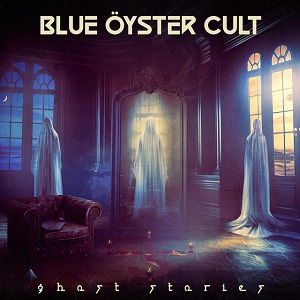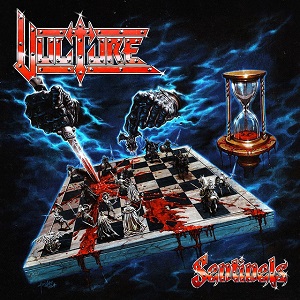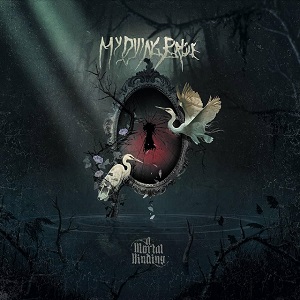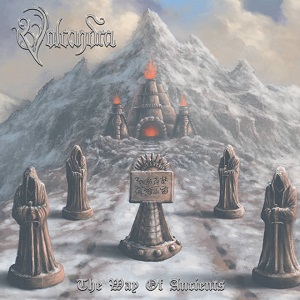MARTY FRIEDMAN – “What Does Everybody In The World Really Want To Hear From Marty Friedman?”
October 21, 2015, 8 years ago

It took awhile, but amidst the considerable Mod Club hub-bub of the Megadeth legend’s long-awaited return to Toronto, myself and very pro guitarist and rock journo Hal Rodriguez, were ushered first upstairs at the club and then across the street to Marty’s bus, where back in the lounge, we got Marty to expound on his craft.
The occasion, as alluded to, is the man’s first extensive North American tour in 13 years, after Prosthetic Records coaxed him from his ambassador duties in Japan as... well, America’s foremost representative of the guitar, one who happens to also be a Tokyo resident now full-time. The occasion is also Friedman’s latest album, Inferno, a full-on metal flank o’ steak, mostly instrumental, very, very smartly crafted—as we shall see.
“This record was done completely at the wish of Prosthetic Records,” begins Friedman, perfectly calm before the storm that will be a surprisingly academic metal onslaught, but one eaten up by a quite full Mod Club. “I was in Japan doing my thing, just absolutely best point in my career ever in Japan. In Japan, completely busy 24/7, all year long. And I got a call from Prosthetic, which is a metal label, saying, ‘There’s a lot of people who are interested in what you are doing in America right now.’ And I had no idea. And they’re like, ‘They really are. Metal is more popular now, people are mentioning you in the interviews more now, and you’re an influence’ and this and that.”
“And I’m going, really? It’s very flattering, but I’m really kind of doing my own thing. ‘Let us come to Japan.’ Prosthetic people came all the way to Japan to talk to my label in Japan. Wow, they must really be serious. And they said look, we want to reissue all of your records that you’ve done for Japan only, and if they go well, we can do an international release together. And I’m like, wow, I mean, you guys, you know what you’re doing. And so I thought, that’s a nice challenge and worth doing. I’ve had a lot of half-assed offers through the years, but nothing has been enough to take attention away from what I’ve been doing in Japan. So they really were sincere about it, and they did everything that they said they’d do. So I took a year-and-a-half and made Inferno, and I made it with the intention of simultaneous worldwide release.”
And then it was a case of give the people what they want, explains Marty. “Yes, so it’s not gonna be any kind of eclectic, avant-garde Japanese-only type of thing. And to be honest, I thought, what does everybody in the world really want to hear from Marty Friedman? And how can I give it to them without being nostalgic? How can I give it to them without doing any selling-out-type thing? How can I do it in a way that I please them and also keeps it new, exciting and fresh for me at the same time? So that was kind of the lofty goal that I had. It took a year-and-a-half to do it. And it was the best recording experience of my life. It took forever, it was a big pain in the ass, but I’m so happy with it. And it made it worth, you know, the effort to put some of my Japanese things on the side, and actually plan a world tour, and do it for a couple months here at a time like this. And that’s where we are.”
There’s a Canadian connection on the record as well, with Marty teaming up with Toronto’s Danko Jones on “I Can’t Relax.” “Oh, I was a fan of his, he was a fan of mine, and we became friends,” notes Friedman. “And we always kind of threatened each other to work on each other’s projects. And this time it finally became a reality. He, to me, is the ultimate. I heard his music, and I’m like, man, this is it. This is real. And we worked on stuff aside from this record too, just that we did for fun. But he’s just such a star, and he almost came today. He’s flying to Europe today. So that’s how that worked.”

With Inferno, Marty went to great pains to craft an album that is purely enjoyable as music, one that doesn’t put him in a category with “shredders” and therefore ghetto-izes the project as an exercise for theorists or guitar students only.
“Okay, this is a really important question,” begins Friedman, responding to Hal’s recognition of this idea all over Inferno. “And this is why I don’t like being sort of dumped into this shredder thing. I rarely... if ever listen to it, if I hear it, it’s completely incidental. And what I always hear when I hear that music is just these drumbeats that are just ‘whatever.’ It’s like the guitarist could not care less about what’s backing him up. It’s got amazing chops, dexterity for days, but the bass playing and the drum playing is just like all these advanced musicians playing. And there’s just absolutely not a second thought given to arrangement, melody, waves of emotion, power, contrast—nothing. It’s just showing how rad they are on the guitar. And I despise that with every fibre of my being. Although I admire a lot of the abilities of these players.”
As for Friedman’s “secret weapon” to avoid this cliché or any other... “To say a secret weapon—and hopefully to some extent you’ll see it tonight—I utilize the arrangement of the song to get excitement in the feeling of the song. And if you come off saying, ‘I like the song,’ that’s great. If you come away saying, ‘He’s a great guitar player,’ I probably failed. If you come off saying, ‘I had a great time and I feel good,’ that’s great. If you say I’ve got great chops, then I failed. Because I had great chops when I was 16 years old. Couldn’t care less. It’s all about listening to music, and going, ‘I want to hear that again.’ And I can really feel that way about instrumental music. Of course, I feel that way all the time about other music—pop music, rock music, metal music, dance music. What do those have? Great arrangements, great melodies, great songs. Sometimes the chorus is bumped up like, two, three bpm, to give it that little subliminal excitement. There’s a billion tricks. I’m doing everything that’s in that music in my instrumental music.”

And one of the tricks, or more of a technique of process, is the sweat ethic of ruthless selection.
“If the song is not kicking my ass, I just throw it away,” explains Marty. “I throw away 90% of everything. I mean... I’m thinking in Japanese, but the idea of ‘concentrate,’ like orange juice? It’s like you need to squeeze 1000 oranges to get juice. I do a lot of crappy shit. But I know one thing, or one other thing I guess, but the longer you play music, the more you know whether you’re onto something or not. A lot of young kids—here’s one for you—they think, you know, they work really, really hard on something, and finally get it done. You’re not going to throw it away because they worked so hard on it. It’s like, ‘I worked on this song for months. The solo is impossible; I finally nailed it. There’s no way I’m throwing it away.’ The song sucks. So I’ve had millions of things that I worked really hard on—the song still sucks; get rid of it. This is something that you know when you’re playing a long time—you know whether you’re onto something or not. At the demo stage, you’re like getting goose bumps, and people are walking by going, ‘Oh yeah, that’s really cool.’ Or you feel like... you know it. But when you’re young and you’re in your first couple of bands, you’ve been working on this for months, this is going to be it. And that’s the wrong judgment. Because other musicians are saying it’s cool. Musicians will blow sunshine up your ass forever. Yeah, because they see that it looks cool when you do this stuff. It looks great. But don’t look at it. Just listen to it—and then you decide.”
“The industry part of it really hasn’t changed at all,” reflects Marty in closing, on forging this tentative return to doing what all his peers do—tour North America on the back of a rawking new album. “I had no idea what to expect on this tour, because I never really... I did one short west coast run—that’s it—like 13 years ago, a solo run. So I never have really played solo stuff outside of Japan or Europe and South America. So no idea if anybody even cares at all. But it’s been fantastic so far. It’s just been rabid, ecstatic. I have no idea what’s going to happen in Canada. Who knows? But even if nobody cares, I’m doing what I love to do—and my band is on fire.”
(Top slider photo by Alitzia Tyminski)












